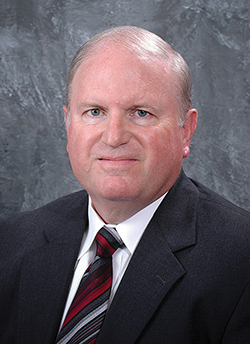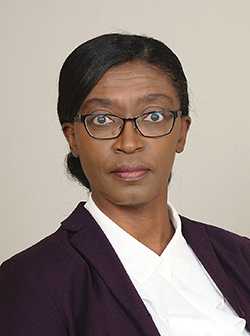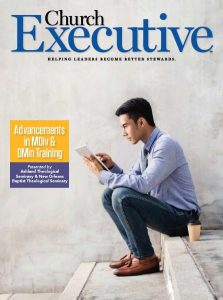
For busy full-time church leaders, an MDiv or DMin degree might seem out of reach. Here’s the reality.

Professor of Leadership and Pastoral Ministry, occupying the Perry Sanders Chair
of Pastoral Leadership
Associate Dean for Professional Doctoral Programs
New Orleans Baptist Theological Seminary
Have full-time church leaders shown increased interest in MDiv and DMin training in recent years?
Reggie Ogea: We have seen an increased interest in training in a variety of areas.
For the MDiv, a lot of larger churches still look for this degree, so there’s a big practical component there. But beyond that, many of our students are choosing the MDiv — either from the start, or by beginning with a shorter MA and transferring their hours — because of its well-rounded nature. Ministry is full of unexpected challenges, and the MDiv is designed to prepare students for this.
When it comes to the DMin, we consistently see two main reasons full-time church leaders are looking for this. The first is to master a new area of ministry. Often, a decade or so of ministry experience will highlight new opportunities, and the DMin provides a guided way of tackling a new direction.
And the second reason is to be positioned to make a mid-career change. Sometimes this means a church leader is moving from a church into denominational leadership, or simply from one church to a larger one.
Mignon R. Jacobs: The interest in the DMin continues, as leaders seek further equipping after being in ministry for a while. The DMin enhances their professional skills in serving their congregations and communities as well as offers opportunities for personal development.
Generally, pastors from denominations for whom the MDiv degree is not required for ordination, tend to pursue professional master’s degrees. At Ashland, however, the MDiv and DMin continue to see higher enrollment than other theological professional and academic master’s degree programs. Students highlight their spiritual formation experience as one of the main reasons for being at Ashland.
“A key part of our DMin program is offering multiple pathways for degree completion, including evening and weekend courses for MDiv students — among whom an increasing number opt to complete their degree part-time, or to remain in their local or regional context. Online and hybrid formats allow for this.” — Mignon R. Jacobs, PhD

Dean
Ashland Theological Seminary
In the past few years, which specializations / concentrations in your seminary’s MDiv program have seen increased interest?
Jacobs: For those desiring vocational flexibility, the chaplaincy concentration within the MDiv offers training needed to be adaptive to the church context as well as to hospital, armed forces and veteran services. Others seek the chaplaincy concentration because it provides training for pastoral care within their congregations.
Ogea: Expository preaching and church planting are growing specialties in the MDiv. Expository preaching uses the Adrian Rogers Center partnership with Love Worth Finding. And for church planting, New Orleans is a NAMB Send City, so there are a lot of opportunities to work with or plant a church in and around the New Orleans area.
Another area we’ve seen a lot of growth in is apologetics. As our world seems to grow further away from Christianity, many see having a firm grasp on apologetics as a necessary skillset.
Over that same time period, which specializations / concentrations in your seminary’s DMin program have seen increased interest?
Ogea: Similar to our MDiv, the key areas where we’ve seen growth in our DMin is strategic leadership, church revitalization, and church health.
Expository preaching and pastoral ministry are popular, too. With many churches declining in membership, many full-time church leaders are seeing the need to expand their impact in these areas.
Jacobs: The chaplaincy track allows students to complete their course work and clinical pastoral education units at the same time, widening the range of options for church, para-church and community-based non-profit leadership.
Through the independent design concentration, students — in consultation with mentors and program directors — focus on distinctive elements of their ministry context and community needs as bases of their program, research and final projects.
Over the past several years, how have your seminary’s MDiv and DMin offerings adapted to better suit the needs of full-time church leaders?
Jacobs: Key parts of our MDiv program is offering multiple pathways for degree completion, including evening and weekend courses for MDiv students — among whom an increasing number opt to complete their degree part-time, or to remain in their local or regional context. Online and hybrid formats allow for access and flexibility to match the needs of the pastors.

For students who desire a full-time residential experience on the seminary’s campus, Ashland offers a cohort option for the MDiv.
For DMin offerings, the hybrid formats — along with one-week intensives — let students participate in face-to-face learning with peers. The DMin program also provides a cohort option for students within particular tracks.
For the MDiv, a hybrid format lets pastors participate in online and face-to-face sessions or hybrid synchronous courses at a regional location. Both the online and hybrid formats let students connect with peers from different locales and have substantive faculty interaction.
Likewise, summer sessions for intensives range from one to six weeks (compared to a 15-week course).
“We’re always seeking to be flexible in our course schedules, but perhaps the biggest change has been using video learning methods. This includes live interactive video (where students can participate as if they were sitting here in class) to recorded video sessions that allow students to participate when their schedules allow.” — Reggie Ogea, ThD, MDiv
Ogea: We’re always seeking to be flexible in our course schedules, but perhaps the biggest change has been using video learning methods. This includes live interactive video (where students can participate as if they were sitting here in class) to recorded video sessions that allow students to participate when their schedules allow.
Mentoring — another key method — allows students to partner with approved mentors in active ministry positions and learn by apprenticeship, while getting class credit.
We regularly review our specializations and, in the case of our DMin, offer our students the ability to customize their specialization.
For full-time church leaders pursuing an MDiv or DMin, what does a typical day / week look like?
Ogea: For students working full-time, there’s always a need to balance family with ministry and education. This can be a struggle, so we try to be as flexible as we can.
For students with access to campus, this can range from getting class credit for conferences or workshops to taking evening or weekend classes when available.
And for our remote students, we prioritize methods like interactive video and others that preserve a high standard of education while understanding that life and ministry will continue to be significant factors.
Jacobs: The MDiv program uses once-per-week courses over the full 15-week semester or five weekends.
For a full-time MDiv student, the week consists of classes in the morning, afternoon or evening; a midweek chapel service; and for the MDiv cohort, reflection groups and other formative experiences. Classes at regional campuses are typically held evenings and weekends, allowing for bi-vocation.
Because the DMin uses one-week intensives throughout the year, a typical week on campus consists of classes, a one-on-one faculty advising session, meals with peers, research and library-related work.
While the church leader is at home, the week might include interaction in the virtual learning environment, allowing peer discussion; faculty-student interaction on assignments; research projects; or follow-up between faculty mentor and student.
If a full-time church leader still believes an MDiv or DMin is out of reach, what advice would you offer?
Jacobs: The multiple pathways offered to complete the MDiv and DMin make them accessible and attractive degrees for pastors.
For leaders who have master’s degrees and want to pursue a DMin, the program director and admissions staff prepare a path to the MDiv equivalency needed to continue on to the DMin program. Each student is paired with a mentor and enhanced through individualized writing and research consultations.
For pastors who are without the time and financial ability for full- or part-time study in a degree program, Ashland offers cohort-based certificates in Christian Ministries, Black Church Studies and Thriving Church Ministries so that pastors are able to continue to be equipped for service in the church even while they discern next steps in their call to ministry.
Ogea: Honestly, we believe with the flexibility and customization of course schedules and offerings, that if God is calling you to seminary, we can help you make that happen. Whether that comes in the form of scholarships, remote access, or even writing help, it’s our mission to best equip you for a successful ministry.
— Reporting by RaeAnn Slaybaugh


